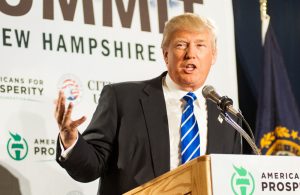U.S. presidential candidate Donald Trump appears to have taken aim at South Korea over its heavy reliance on the American military for its defense. While campaigning in South Carolina on Tuesday, the bombastic Republican contender seemed to suggest that South Korea, as a wealthy country in its own right, doesn’t deserve U.S. protection, reported Yonhap News.
Trump, who has repeatedly made headlines with provocative comments in recent weeks, had been rallying against Washington’s defense commitment to Saudi Arabia when he mentioned South Korea, only to be cut off by a member of the audience. While Trump did not expand on his opinion of South Korea, he has previously blasted the defense pact it shares with the United States, which sees some 28,500 American soldiers stationed in the country.
“How long will we go on defending South Korea from North Korea without payment?” Trump complains in a video uploaded on his YouTube channel in 2013.
“When will they start to pay us?” he adds a little later.
In fact, “they” already do pay– albeit only a portion of the full cost. Last year, the Seoul government was liable for $861 million of the cost of maintaining the U.S. presence on the Korean Peninsula. That figure, however, accounted for less than half of the full cost.
While Trump is wrong on the specifics, his complaint nevertheless touches on longstanding discontent over the situation in some U.S. circles.
For years, Doug Bandow, a senior fellow at the Cato Institute, has advocated for a U.S. withdrawal to allow South Korea to take care of its own defenses. Writing in Forbes earlier this month, he implored the U.S. government to throw South Korea off the “defense dole.”
The alliance has its critics in South Korea, too. Left-wing groups such as Solidarity for Peace and Reunification of Korea see the U.S. presence as a barrier to reunification with North Korea and an imposition on South Korea’s sovereignty.
Overall support for the alliance in South Korea, however, remains strong. Almost 94 percent of respondents supported the pact in a survey carried out by Asan Institute last year.
“Most Koreans really appreciate the presence of the U.S. forces in Korea,” Yang Uk, a research fellow at Korea Security and Defense Forum, told The Diplomat.
Uk challenged the notion that the alliance is one-sided, arguing that the U.S. and South Korea have a common threat in North Korea, which they work together to deter.
“The concept that South Korea is just free riding the U.S. war machine is absurd,” he said.
It’s not clear that Trump’s stance is a winning strategy at home, either. Three-fifths of Americans supported a long-term military presence in South Korea in a poll carried out by the Chicago Council on Global Affairs in 2012.

































